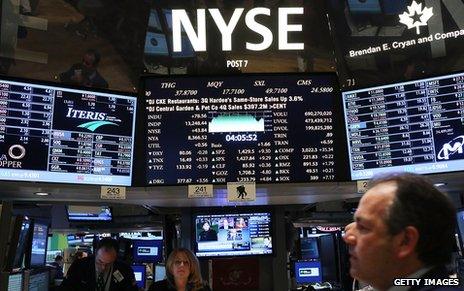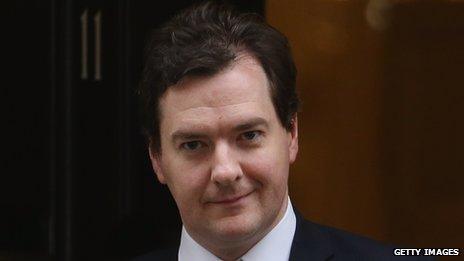Will 2013 be a bull year for shares?
- Published
- comments

Here is a bit of hocus-pocus courtesy of Jim O'Neill, chairman of Goldman Sachs Asset Management.
In his recent letter to investors, external he talks about the "great Almanac rule" that "if the US market is net positive after the first five days of trading [in a new year], with something like an 85% success rate since 1950 the market is not only up for the year but there is a gain of around 14% on average".
To translate, he is saying that on the basis of more than 60 years of historic market performance, if the S&P 500 index closes tonight above its opening level at the start of the year, it should be a very good year for shares - and not just US shares, because UK shares (for example) tend to follow where Wall Street leads.
Anyway, although shares were down a bit yesterday, the S&P 500 is still 2.5% above where it opened the year on Jan 2. And today is the putatively magical fifth trading day. So, on this bit of tea-leaf reading, we're off to the races so long as shares don't fall more than that 2.5% today.
Unless that is you think placing bets on the basis of the historic early-year outings of the S&P 500 is rather less rational than studying the form guide of nags in the Racing Post.
That said, Jim O'Neill isn't just any old tipster.
And as he points out, there may be other reasons to believe that big investors' love affair with bonds, especially government bonds, may be supplanted by a restored affection for equities - or to use the dreadful jargon, this may be a year of "rotation" out of debt and into shares.
To be clear, it is not that the economies of debt-mired Western nations are reviving with any great vigour. The post-crash "new normal" of something that looks a lot like endless stagnation has not been supplanted. But recent stats may show that the economic anaemia inflicting the US and much of Europe, including the UK, may be a bit less pernicious than feared - or at least no worse.
Around the globe, manufacturers, in particular, seem to be doing a bit better. That said, manufacturing is a much smaller contributor to growth in western economies than services, and services - especially domestic services such as retail in the UK - still look soft (and are likely to remain so, if healthy rebalancing from consumption to investment is sustained).
The corollary of any serious flow of money into shares would probably be less demand for the supposedly safest assets, namely the bonds of government perceived to have a de minimis default risk.
It is striking that the price of US and UK official debt has been falling - so, for example, the British government would now pay more than 2% to borrow for more than 10 years, for the first time since May.

A share revival may not necessarily be good news for George Osborne
There is a painful paradox for George Osborne, the British chancellor, in the revival of investors' animal spirits, their optimism, which stems in large part from the perception that the risk of a eurozone fracture has diminished.
The point is that if investors began to take the view that the risk of eurozone collapse had become negligible once more - and the next great staging post in keeping this rickety thing intact will be the Italian elections - then in one important but narrow sense that would be quite bad news for him.
Because in the ugly contest of where investors squirrel their cash, highly indebted Britain would look relatively uglier, if not absolutely uglier.
And that means he would find it significantly harder and more expensive to borrow the colossal new sums he will need for many years yet.
Or to put it another way, a eurozone recovery that looked real and sustainable could actually increase the budgetary squeeze faced by the Chancellor, as his interest cost would probably rise.
Here is what you may think of as markets' bad-taste joke: if Britain were to lose its AAA credit rating in the coming weeks - which looks highly likely - that would be very embarrassing for a government that made it a badge of honour to retain the fabled AAA; but in a fiscal sense, the revival of investor confidence in Spain, Italy, Portugal, Ireland and Greece would be rather more expensive for Osborne and the Treasury.